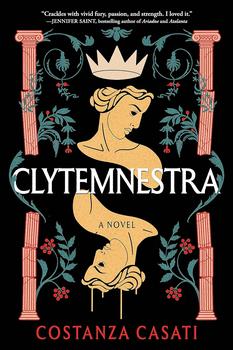Summary | Excerpt | Reviews | Beyond the book | Read-Alikes | Genres & Themes | Author Bio

Recent years have seen a trend in reinventions of Greek myths and legends, some from the perspectives of women. Novels like Madeline Miller's Circe and Pat Barker's The Silence of the Girls have done wonders for fleshing out and adding dimension to the library of stories from ancient Greece that we have been telling and retelling for centuries. We have even been gifted a fresh translation of the Odyssey by Emily Wilson, the first-ever rendering of Homer's epic into English to be completed by a woman. Now, classicist Natalie Haynes makes a dynamic and important addition to this library with her novel A Thousand Ships.
While Circe and The Silence of the Girls take overlooked women characters — from the Odyssey and Iliad respectively — and add weight and perspective to their stories, Haynes opts for a different approach here. And it is this approach that ultimately allows A Thousand Ships to shine: There is no central protagonist, nor one established narrator. While the muse Calliope appears and vanishes several times, the story is also guided by The Trojan Women, a group left vulnerable and frightened as the Greeks sack their home. They speak of the Amazon queen Penthesilea and Briseis, wife of the king of Lyrnessus; this leads into lengthy chapters exploring the lives and exploits of the mythological female characters.
After a prologue of sorts that sets the tone as Calliope teases at what is to come, Haynes' novel begins with the sacking of Troy. Creusa, wife of Aeneas, beholds her city — sieged for 10 years by the Greeks — burning. Twisting the tradition of Greek epics right from the start, A Thousand Ships opens with a muse for a narrator and a queen for a protagonist, rather than a poet-narrator and male-warrior-protagonist, as we see in the Iliad with Homer and his hero Achilles.
This is not to say that there aren't men in the novel. Readers well-versed in Greek epics will find familiarity at the mention of Hector, Odysseus, Agamemnon, Priam and more. But it's the women who take center stage. War has affected them as much as it has the men, and at last they're having their stories told.
A Thousand Ships takes us through different locations in time and space, covering established moments and events in Greek history and mythology, even seamlessly incorporating deities such as Gaia and Artemis. In jumping back and forth — gently yet unpredictably — it is as though Haynes is casting a length of string between various points and stitching them together through the experiences of the novel's featured women.
All this would be for naught if the characters weren't interesting, and it certainly is a tall order to ensure that each mother, daughter, soldier and civilian is given a unique voice, but Haynes does so with gusto. Her women are fully realized people with distinct personalities — most memorable, perhaps, is Penelope, wife of Odysseus, whose chapters come in the form of sarcastic, witty letters to her voyaging husband (a stylistic choice made by the author rather than an imposition of modernity). However brief characters' appearances may be, they are always given time to embed themselves in the story before it moves on. This is the book's other great strength: In its tapestry-like approach to telling its tales, A Thousand Ships succeeds in giving equal attention and flavor to every piece of the narrative.
The book does have an Achilles' heel, so to speak, that being the feeling of alienation that some readers are likely to experience. While Haynes' novel can certainly be enjoyed by anyone — its themes of war, loss, struggle and sisterhood are universal — the more familiar a reader is with classics, the more the characters will mean to them. Many mythological figures lack introduction, with the author assuming we know who they are. Readers who pick up the book without knowing the story of the Trojan War (see Beyond the Book) — along with the characters of Helen, Paris and Priam — may at times feel a little lost.
Despite this one shortcoming, A Thousand Ships is still a faultlessly drawn depiction of human life and wartime experiences. It gives new color to not only the women of Greek legend but also their men. Reading Haynes' novel feels like seeing a two-dimensional world in 3D for the first time, as so much depth and consideration is given to people and stories who have been mentioned for centuries but never fully explored in this way until now.
![]() This review was originally published in The BookBrowse Review in February 2021, and has been updated for the
November 2021 edition.
Click here to go to this issue.
This review was originally published in The BookBrowse Review in February 2021, and has been updated for the
November 2021 edition.
Click here to go to this issue.

If you liked A Thousand Ships, try these:

by Caro De Robertis
Published 2024
Perfect for fans of Circe and Black Sun, this bold and subversive feminist retelling of the Greek myth of Psyche and Eros explores the power of queer joy and freedom.

by Costanza Casati
Published 2024
Madeline Miller's Circe meets Cersei Lannister in a stunning debut following Clytemnestra, the most notorious heroine of the ancient world and the events that forged her into the legendary queen.
Life is the garment we continually alter, but which never seems to fit.
Click Here to find out who said this, as well as discovering other famous literary quotes!
Your guide toexceptional books
BookBrowse seeks out and recommends the best in contemporary fiction and nonfiction—books that not only engage and entertain but also deepen our understanding of ourselves and the world around us.